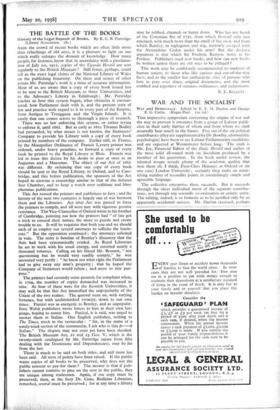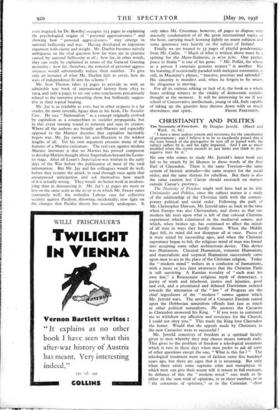WAR AND THE SOCIALIST THIS impressive symposium concernin g the ori g ins
of war and the way to prevent it emanates from a group of Labour publi- cists in their early thirties of whom and from whom we shall assuredly hear much in the future. Five out of the six political contributors (they are supplemented by Dr. Bowlby, a formidable psychologist) have been or are Labour Parliamentary candidates and are expected at Westminster before long. The sixth is Mr. Jay, Financial Editor of the Daily Herald and author of the most solid all-round work on Socialism produced by a member of his generation. In the book under review, the talented troupe reveals plenty of the academic quality that won them all, I think, First-Class Honours at Oxford or (in one case) London University ; certainly they make an aston- ishing number of recondite points in astonishingly simple and agreeable language.
The collective enterprise, then, succeeds. But it succeeds through the sheer individual merit of the separate contribu- tions, not through any scientific co-ordination or artistic unity. The editing, indeed, is so fantastic as to be justified only by an apparently accidental success. Mr. Durbin (assisted, perhaps even inspired, by Dr. Bowlby) occupies 153 pages in explaining the psychological origins of " personal aggressiveness ." and showing how " personal aggressiveness " may emerge in national bellicosity and war. Having developed an ingenious argument with clarity and weight, Mr. Durbin becomes naively ambiguous on the vital question how far wars are in practice caused by national bellicosity at all ; how far, in other words, they can really be explained in terms of the General Goering mentality ; how far, therefore, the removal of personal aggres- siveness would substantially reduce their number. To give only an instance of what Mr. Durbin fails to cover, how do wars of independence fit into his scheme ?
Mr. Ivor Thomas takes 53 pages to provide us with an 'admirable text book of international history from 1815 to 1914, and only 9 pages to set out some conclusions precariously related to the narrative preceding them but brilliantly sugges- tive in their topical bearing.
Mr. Jay is as readable as ever, but in other respects is a far cruder, far more juvenile, figure than in his book, The Socialist Case. He sees " Nationalism " as a concept originally evolved by capitalism as a counterblast to socialist propaganda, but in this event turning round to torment and ruin its creator. Where all the authors are broadly anti-Marxist and especially opposed to the Marxist doctrine that capitalism inevitably begets war, Mr. Jay carries his anti-Marxism to the wildest lengths of all. Yet his own argument presents many of the features of a Marxist caricature. The real case against modern Marxist literature is that no Marxist has proved competent to develop Marxist thought about Imperialism beyond the Lenin- ist stage. After all Lenin's Imperialism was written in the early days of the War before the publication of most of the vital information. But Mr. Jay and his colleagues would do well, before they resume the attack, to read through once again that unsurpassed anticipation and ask themselves how much of it is actually wrong. They would do better work in modern- ising than in denouncing it. Mr. Jay's 32 pages are more or less on the same scale as the 20 or so in which Mr. Fraser states (extremely well) the orthodox Labour case for collective security against Pacifism, throwing, incidentally, new light on the changes that Pacifist theory has recently undergone. It
only takes -Mr. Crossman, however; -28 pages -to dispose witi- masterly condensation' of all the great international topics 01 the hour, carrying much learning lightly on many subjects and some ignorance very heavily on the subject of Ireland.
Finally we are treated to 53 pages of playful ponderosities from Mr. Catlin. " Much of what is written above must be a spitting for the Marx-Stalinists, je m'en fiche. One prefers peace to Stalin " is one of his gems. " Mr. Pollitt, for whom as a person I entertain genuine respect " is another. But his learning, if occasionally paraded with inelegant ostentation, is still, in Macaulay's phrase, " massive, precious and splendid." His sincerity is manifest and, when he forgets to be smart, his eloquence is moving.
For all its curious editing or lack of it, the book as a whole bears striking witness to the vitality of democratic socialist thought at the moment. It will be interesting to see if any school of Conservative intellectuals, young or old, feels capable of taking up the gauntlet here thrown down with so much



















































 Previous page
Previous page